英语写作中词语的选择
英语词语运用的技巧和方法
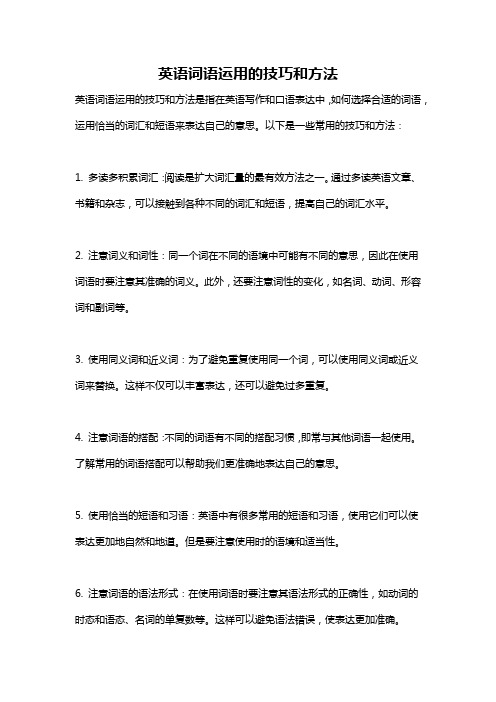
英语词语运用的技巧和方法英语词语运用的技巧和方法是指在英语写作和口语表达中,如何选择合适的词语,运用恰当的词汇和短语来表达自己的意思。
以下是一些常用的技巧和方法:1. 多读多积累词汇:阅读是扩大词汇量的最有效方法之一。
通过多读英语文章、书籍和杂志,可以接触到各种不同的词汇和短语,提高自己的词汇水平。
2. 注意词义和词性:同一个词在不同的语境中可能有不同的意思,因此在使用词语时要注意其准确的词义。
此外,还要注意词性的变化,如名词、动词、形容词和副词等。
3. 使用同义词和近义词:为了避免重复使用同一个词,可以使用同义词或近义词来替换。
这样不仅可以丰富表达,还可以避免过多重复。
4. 注意词语的搭配:不同的词语有不同的搭配习惯,即常与其他词语一起使用。
了解常用的词语搭配可以帮助我们更准确地表达自己的意思。
5. 使用恰当的短语和习语:英语中有很多常用的短语和习语,使用它们可以使表达更加地自然和地道。
但是要注意使用时的语境和适当性。
6. 注意词语的语法形式:在使用词语时要注意其语法形式的正确性,如动词的时态和语态、名词的单复数等。
这样可以避免语法错误,使表达更加准确。
7. 使用具体和生动的词语:使用具体和生动的词语可以使表达更加形象和有力。
通过使用形象化的词语,可以更好地吸引读者的注意力。
8. 避免使用过于复杂的词汇:在表达时要尽量避免使用过于复杂的词汇,以免给读者造成困惑。
简洁明了的表达更容易被理解和接受。
9. 注意词语的正式程度:在不同的场合和语境中,要注意词语的正式程度。
在正式场合中使用正式的词汇,而在非正式场合中使用更为口语化的词汇。
10. 多练习和反馈:通过不断的练习和反馈,可以提高自己的词语运用能力。
可以请教老师或朋友,让他们帮助纠正自己的错误和提出改进意见。
总之,英语词语运用的技巧和方法需要通过大量的阅读和实践来提高。
通过积累词汇、注意词义和词性、使用同义词和近义词、注意词语的搭配、使用恰当的短语和习语、注意词语的语法形式、使用具体和生动的词语、避免使用过于复杂的词汇、注意词语的正式程度以及多练习和反馈等方法,可以提高自己的词语运用能力,使自己的表达更加准确、生动和地道。
四六级英语写作中使用频率最高的100个实用词语搭配
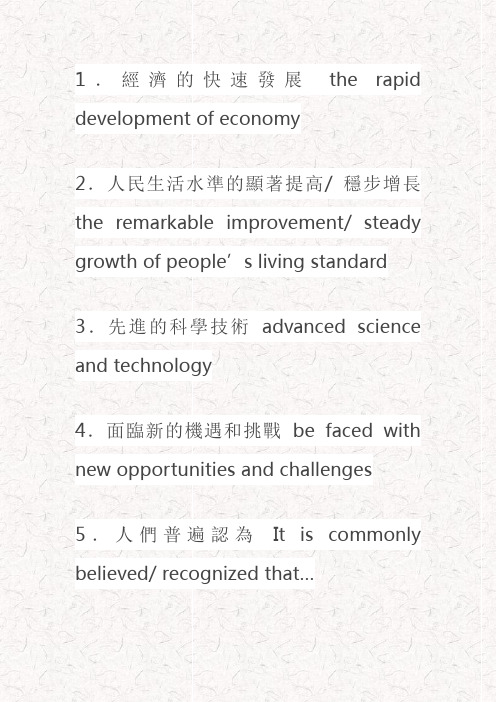
1.經濟的快速發展the rapid development of economy2.人民生活水準的顯著提高/ 穩步增長the remarkable improvement/ steady growth of people’s living standard3.先進的科學技術advanced science and technology4.面臨新的機遇和挑戰be faced with new opportunities and challenges5.人們普遍認為It is commonly believed/ recognized that…6.社會發展的必然結果the inevitable result of social development7.引起了廣泛的公眾關注arouse wide public concern/ draw public attention8.不可否認It is undeniable that…/ There is no denying that…9.熱烈的討論/ 爭論 a heated discussion/ debate10. 有爭議性的問題 a controversial issue11.完全不同的觀點a totally differentargument12.一些人…而另外一些人… Some people… while others…13. 就我而言/ 就個人而言As far as I am concerned, / Personally,14.就…達到絕對的一致reach an absolute consensus on…15.有充分的理由支持be supported by sound reasons16.雙方的論點arguments on both sides17.發揮著日益重要的作用play an increasingly important role in…18.對…必不可少be indispensable to …19.正如諺語所說As the proverb goes:20.…也不例外…be no exception21.對…產生有利/不利的影響exert positive/ negative effects on…22.利遠遠大於弊the advantages far outweigh the disadvantages.23.導致,引起lead to/ give rise to/。
英语作文联接词
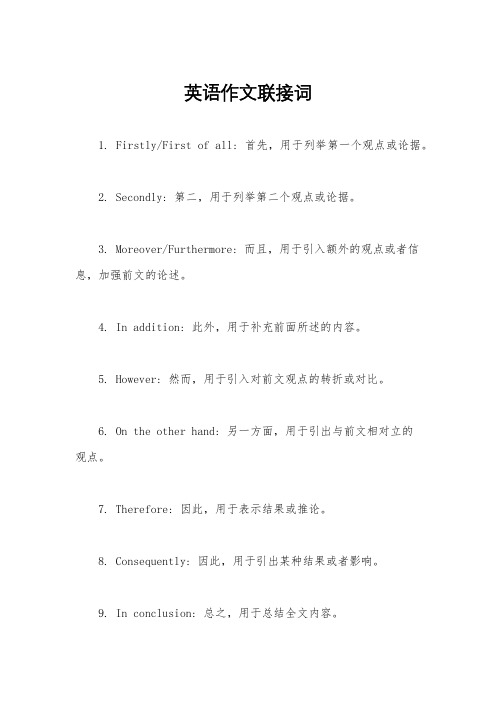
英语作文联接词
1. Firstly/First of all: 首先,用于列举第一个观点或论据。
2. Secondly: 第二,用于列举第二个观点或论据。
3. Moreover/Furthermore: 而且,用于引入额外的观点或者信息,加强前文的论述。
4. In addition: 此外,用于补充前面所述的内容。
5. However: 然而,用于引入对前文观点的转折或对比。
6. On the other hand: 另一方面,用于引出与前文相对立的
观点。
7. Therefore: 因此,用于表示结果或推论。
8. Consequently: 因此,用于引出某种结果或者影响。
9. In conclusion: 总之,用于总结全文内容。
10. To sum up: 总而言之,用于总结全文观点。
这些联接词可以在文章中灵活运用,使得文章的结构更加清晰,逻辑更加严谨。
在写作时,记得不要过度使用同一个联接词,要根
据具体语境选择合适的词语,以保证文章的表达流畅自然。
大学英语四级写作指导(词汇篇-基础知识) (1)
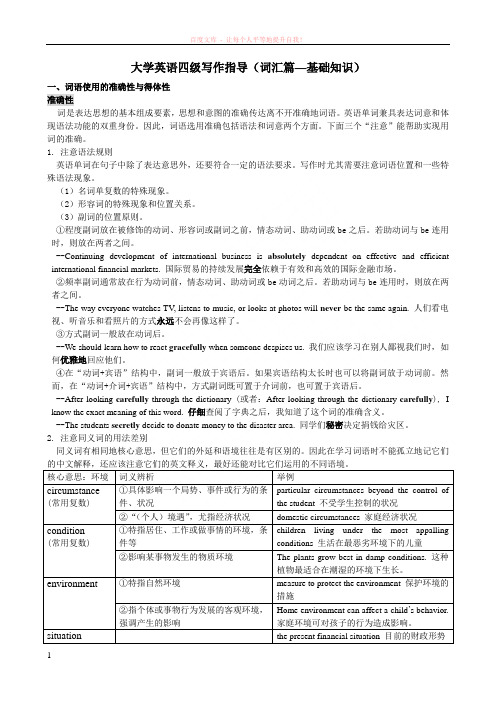
大学英语四级写作指导(词汇篇—基础知识)一、词语使用的准确性与得体性准确性词是表达思想的基本组成要素,思想和意图的准确传达离不开准确地词语。
英语单词兼具表达词意和体现语法功能的双重身份。
因此,词语选用准确包括语法和词意两个方面。
下面三个“注意”能帮助实现用词的准确。
1. 注意语法规则英语单词在句子中除了表达意思外,还要符合一定的语法要求。
写作时尤其需要注意词语位置和一些特殊语法现象。
(1)名词单复数的特殊现象。
(2)形容词的特殊现象和位置关系。
(3)副词的位置原则。
①程度副词放在被修饰的动词、形容词或副词之前,情态动词、助动词或be之后。
若助动词与be连用时,则放在两者之间。
--Continuing development of international business is absolutely dependent on effective and efficient international financial markets.国际贸易的持续发展完全依赖于有效和高效的国际金融市场。
②频率副词通常放在行为动词前,情态动词、助动词或be动词之后。
若助动词与be连用时,则放在两者之间。
--The way everyone watches TV, listens to music, or looks at photos will never be the same again. 人们看电视、听音乐和看照片的方式永远不会再像这样了。
③方式副词一般放在动词后。
--We should learn how to react gracefully when someone despises us.我们应该学习在别人鄙视我们时,如何优雅地回应他们。
④在“动词+宾语”结构中,副词一般放于宾语后。
如果宾语结构太长时也可以将副词放于动词前。
然而,在“动词+介词+宾语”结构中,方式副词既可置于介词前,也可置于宾语后。
英语语法与词汇详解 英语基础写作中 词语的意义

英语语法与词汇详解英语基础写作中词语的意义词语的意义与汉语一样,英语中的词语也有不同意义的表达功能。
写作时,作者应根据文章的题材、读者对象,以及写作目的等来选择合适的词语。
①词的本义(Denotation)即词语的基本意义,指词语字面的含义,用来表示客观的、中性的表达。
②词的转义(Connotation)指词语的引申义,一般带有联想和感情色彩->例句1:The girl is thin\slender\skinny.->解析句子:thin表示“瘦的”是中性词,属于词的本义;slender和skinny则分别含有褒、贬的引申义,可分别翻译为“苗条的”和“皮包骨的”。
①在英语中,有的词语用来表示具体性(Specification)的概念,有的表示概括性(Generality)的概念。
②使用具体性的词语可以得到具体形象的表达效果,使用概括性的词语可以得到概括抽象的表达效果。
->例:He is a good boy.He is a(n) kind\honest\just\generous\brave\warm-hearted\selfless boy.->例句中的good是概括性的词,kind等词是具体性的词。
写作中应根据写作需要予以选择使用。
①搭配(Collocation)指英语词语中,某些词经常放在一起使用,表达一定的词义,是一种固定的、约定俗成的用法习惯。
-> Would you like a cup of black tea?->例句中的black tea指的是红茶,是英语词语搭配习惯,不能写成red tea,导致误解。
词义的搭配中也包含习语(Idioms)和短语(Phrases)的搭配。
①英语中的同义词(Synonym)、近义词(Homoionym)以及反义词(Antonym)都很多,使用时要认真对比,找出其在含义和感情色彩上的不同,选择能够确切表达思想的词语用于写作当中。
介词短语的词语选择

介词短语的词语选择介词短语在英语写作中扮演着重要的角色,它们用来表示事物之间的关系,起到连接句子成分的作用。
然而,在选择合适的词语时,许多学习者常常感到困惑。
本文将探讨介词短语的词语选择,帮助读者更好地理解和运用它们。
一、背景介绍介词短语是由一个介词和其后的名词短语构成。
它们可以用来表示时间、地点、原因、目的、方式等关系。
在使用介词短语时,正确选择合适的介词以及后面的名词短语是至关重要的。
下面将介绍一些常见的介词及其用法。
二、常见介词的用法1. in介词"in"经常用来表示时间、地点和方式。
例如:- 时间:in the morning(早晨)、in the evening(晚上)、in July (七月)- 地点:in the park(在公园)、in the city(在城市)- 方式:in silence(静默)、in English(用英语)2. on介词"on"常用来表示时间和地点。
例如:- 时间:on Monday(星期一)、on July 1st(7月1日)- 地点:on the table(在桌子上)、on the street(在街上)3. at介词"at"通常用来表示时间和地点。
例如:- 时间:at 8 o'clock(在8点)、at midnight(午夜)- 地点:at home(在家)、at the airport(在机场)4. to介词"to"多用来表示方向、目的和比较。
例如:- 方向:go to school(去学校)、come to me(来我这里)- 目的:give books to children(给孩子们书籍)- 比较:similar to(类似于)、equal to(等于)5. with介词"with"常用来表示伴随、工具、方式等。
例如:- 伴随:go to the park with friends(和朋友去公园)- 工具:write with a pen(用钢笔写)- 方式:speak with confidence(自信地说话)三、选择合适的词语构成介词短语对于表达准确、流畅的英语写作至关重要。
【高中英语写作训练】靓化词汇——学会运用高级表达
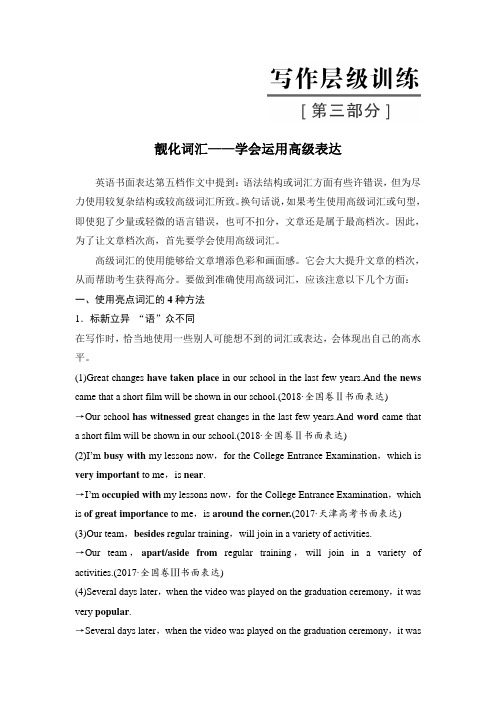
靓化词汇——学会运用高级表达英语书面表达第五档作文中提到:语法结构或词汇方面有些许错误,但为尽力使用较复杂结构或较高级词汇所致。
换句话说,如果考生使用高级词汇或句型,即使犯了少量或轻微的语言错误,也可不扣分,文章还是属于最高档次。
因此,为了让文章档次高,首先要学会使用高级词汇。
高级词汇的使用能够给文章增添色彩和画面感。
它会大大提升文章的档次,从而帮助考生获得高分。
要做到准确使用高级词汇,应该注意以下几个方面:一、使用亮点词汇的4种方法1.标新立异“语”众不同在写作时,恰当地使用一些别人可能想不到的词汇或表达,会体现出自己的高水平。
(1)Great changes have taken place in our school in the last few years.And the news came that a short film will be shown in our school.(2018·全国卷Ⅱ书面表达)→Our school has witnessed great changes in the last few years.And word came thata short film will be shown in our school.(2018·全国卷Ⅱ书面表达)(2)I’m busy with my lessons now,for the College Entrance Examination,which is very important to me,is near.→I’m occupied with my lessons now,for the College Entrance Examination,which is of great importance to me,is around the corner.(2017·天津高考书面表达) (3)Our team,besides regular training,will join in a variety of activities.→Our team,apart/aside from regular training,will join in a variety of activities.(2017·全国卷Ⅲ书面表达)(4)Several days later,when the video was played on the graduation ceremony,it was very popular.→Several days later,when the video was played on the graduation ceremony,it waswell received.(2017·北京高考书面表达)2.多样表达避免重复在写作时,应尽量避免重复使用相同的单词或短语,要尽量用贴切多样的词语来展示自己的水平。
英语写作应慎重选词
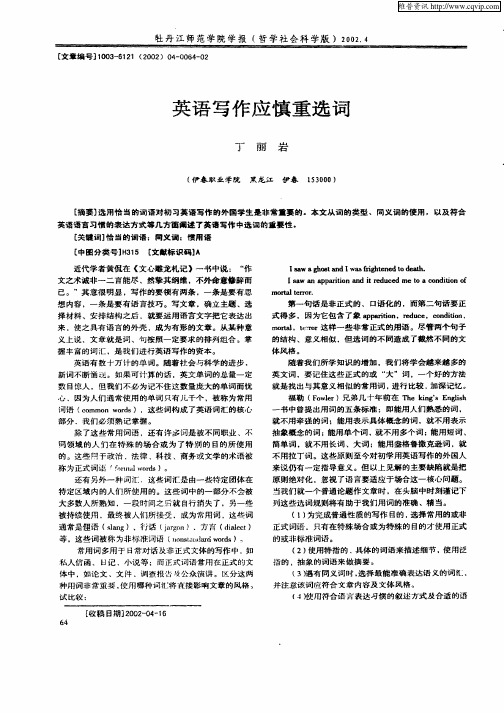
想 内容 ,一 条 是要 有语 言技巧 。写 文 章 ,确立 主题 、选 择 材料 、安 排 结构 之 后 .就要 运用 语 言 文字把 它 表达 出
来 .使 之具 有语 言 的 外壳 ,成 为有 形 的 文章 。从某 种 意 义上说 ,文 章 就是 词 、句按 照一 定要 求 的排列 组合 。掌
私 人信 函 、 日记 、小说 等 :而 正式 词语 常用 在 正式 的文 体 中 .如论 文 、文 件 、调查 报 告 岐公 众演讲 。区分这 两
正式 词语 .只有在 特 殊场 合 或 为特殊 的 目的才使 用 正式
的 或非标 准 词语 。
( 使 用 特指 的 、具体 的词 语来 描述 细 节 . 用 泛 2) 使
一
词语 ( o cmmo od n w rs).这 些词 构成 了英语 词 汇的核 心
部分 .我 们必 须 熟 记掌 握 。 除 了这 些常 用词 语 ,还 有 许多 词是 被不 同职业 、不
书 中曾提 出用 词 的五 条标 准 :即能用 人们 熟悉 的 词 ,
就 不用 牵 强的词 ;能用 表示 具 体概 念 的词 ,就 不用 表示 抽 象 概念 的词 ;能用单 个 词 .就 不用 多个 词 ;能 用短 词 、 简 单 词 。就 不用长 词 、大 词 ;能 用盎 格鲁 撒 克逊词 。就 不 用拉 丁 词 。这些 原 则至 今对 初学 用英语 写作 的 外 国人
第一 句话 是非 正 式 的 、 口语 化 的 ,而第 二句 话 要正
式得 多 .因为它 包含 了象 a p r in e u e on io , p aio ,rd c ,c dt n t i
m r l e 这样一些非常正式 的用语。尽管两个句子 o a,t t w
英文写作中表示喜欢的词语

英文写作中表示喜欢的词语
在英语写作中,表示喜欢通常使用一些特定的词语。
本文将介绍一些常用的表示喜欢的英语词语。
在英语写作中,表达喜欢通常使用一些特定的单词和短语。
这些词语可以用于描述对事物、人物或活动的喜爱。
下面是一些常用的表示喜欢的英语词语:
1. Love:这是一个最常用的单词来表达喜欢。
它可以用于描述对事物、人物或活动的喜爱。
例如:I love pizza.(我喜欢披萨。
)
2. Enjoy:这个词通常用于描述享受某件事情的过程。
例如:I enjoy reading books.(我喜欢看书。
)
3. Favorite:这个词用于描述最喜欢的事物、人物或活动。
例如:Chocolate is my favorite food.(巧克力是我最喜欢的食物。
)
4. Like:这个词用于描述对某事物的喜爱,但是比“love”的程度要轻一些。
例如:I like apples.(我喜欢苹果。
)
5. Prefer:这个词用于描述更喜欢某个事物而不是另一个。
例如:I prefer tea over coffee.(我更喜欢茶而不是咖啡。
)
6. Be fond of:这个词用于描述对某事物的喜爱。
例如:She is fond of drawing.(她喜欢画画。
)
7. Be crazy about:这个词用于描述对某事物的狂热喜爱。
例如:He is crazy about soccer.(他狂热喜欢足球。
)
总结起来,这些词语都可以用来表达喜欢。
英语作文重要的代替词汇
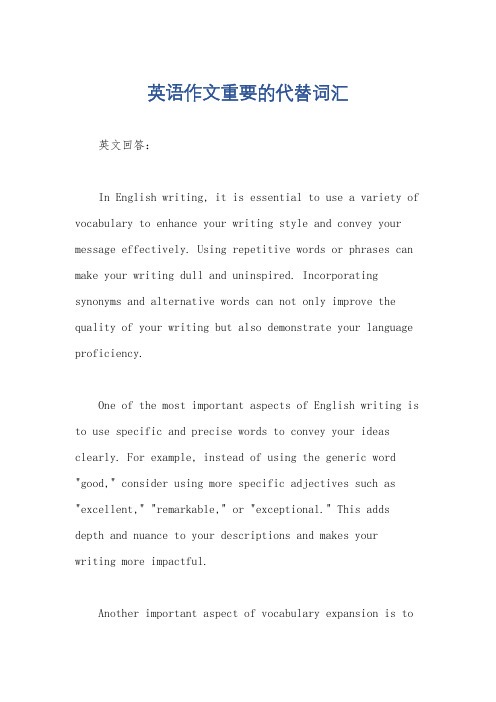
英语作文重要的代替词汇英文回答:In English writing, it is essential to use a variety of vocabulary to enhance your writing style and convey your message effectively. Using repetitive words or phrases can make your writing dull and uninspired. Incorporating synonyms and alternative words can not only improve the quality of your writing but also demonstrate your language proficiency.One of the most important aspects of English writing is to use specific and precise words to convey your ideas clearly. For example, instead of using the generic word "good," consider using more specific adjectives such as "excellent," "remarkable," or "exceptional." This adds depth and nuance to your descriptions and makes yourwriting more impactful.Another important aspect of vocabulary expansion is touse synonyms and avoid repetition. For instance, if youhave already used the word "beautiful" in a sentence, you can use a synonym such as "stunning," "magnificent," or "breathtaking" in the next sentence to maintain variety. This technique keeps your writing fresh and engaging.Furthermore, using different parts of speech can add variety and sophistication to your writing. Instead ofusing only nouns and verbs, incorporate adjectives, adverbs, and other parts of speech to create vivid descriptions and convey your ideas more effectively. For example, instead of simply stating "The sunset was beautiful," you could write, "The sunset blazed with an incandescent glow, casting an ethereal aura over the landscape."Expanding your vocabulary also involves using appropriate idioms and phrases to enhance your writing. Idioms are expressions that have a figurative meaning and are often used to add humor, emphasis, or cultural contextto your writing. For example, instead of saying "It was a difficult task," you could use the idiom "It was an uphill battle."In addition to using different words and phrases, it is also important to pay attention to the tone and register of your writing. Formal writing, such as academic essays or professional reports, requires a more sophisticated vocabulary than informal writing, such as personal letters or blog posts. Using the appropriate tone and register will help you convey your message effectively and maintain a consistent style throughout your writing.中文回答:英语写作中,使用丰富的词汇量对于提升写作风格、有效传达信息至关重要。
英语写作中使用频率较高的词语搭配

59.长远利益. interest in the long run
60.…有其自身的优缺点 … has its merits and demerits/ advantages and disadvantages
61.扬长避短 Exploit to the full one’s favorable conditions and avoid unfavorable ones
31. 从另一个角度 from another perspective
32.做出共同努力 make joint efforts
33. 对…有益 be beneficial / conducive to…
34.为社会做贡献 make contributions to the society
52.支持前/后种观点的人 people / those in fovor of the former/ latteropinion
53.有/ 提供如下理由/ 证据 have/ provide the following reasons/ evidence
54.在一定程度上 to some extent/ degree / in some way
49.社会进步的体现 a symbol of society progress
50.科技的飞速更新 the ever-accelerated updating of science and technology
51.对这一问题持有不同态度 hold different attitudes towards this issue
10. 有争议性的问题 a controversial issue
11.完全不同的观点 a totally different argument
英语写作过渡性词语大全教案让你的文章变得通顺流畅
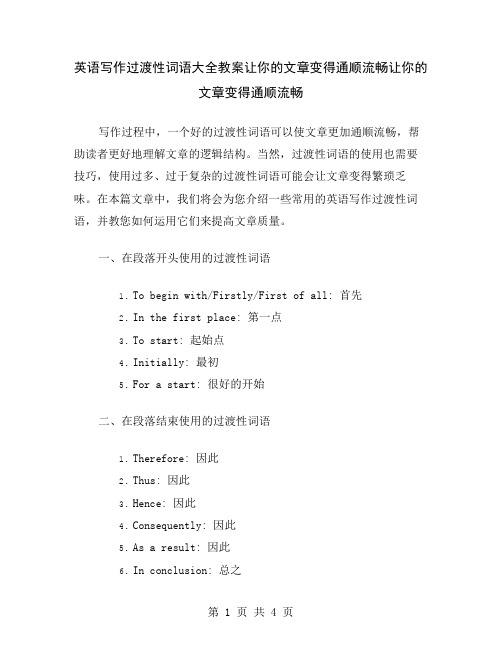
英语写作过渡性词语大全教案让你的文章变得通顺流畅让你的文章变得通顺流畅写作过程中,一个好的过渡性词语可以使文章更加通顺流畅,帮助读者更好地理解文章的逻辑结构。
当然,过渡性词语的使用也需要技巧,使用过多、过于复杂的过渡性词语可能会让文章变得繁琐乏味。
在本篇文章中,我们将会为您介绍一些常用的英语写作过渡性词语,并教您如何运用它们来提高文章质量。
一、在段落开头使用的过渡性词语1.To begin with/Firstly/First of all: 首先2.In the first place: 第一点3.To start: 起始点4.Initially: 最初5.For a start: 很好的开始二、在段落结束使用的过渡性词语1.Therefore: 因此2.Thus: 因此3.Hence: 因此4.Consequently: 因此5.As a result: 因此6.In conclusion: 总之7.To conclude: 总之三、在段落内使用的过渡性词语1.Furthermore: 此外2.Additionally: 此外3.Moreover: 此外4.Also: 此外5.In addition: 此外6.Likewise: 同样地7.Similarly: 同样地四、在表达转折关系时使用的过渡性词语1.However: 然而2.Nevertheless: 然而3.Nonetheless: 然而4.But: 但是5.Although: 虽然6.Despite: 尽管7.In spite of: 尽管五、在举例子时使用的过渡性词语1.For example: 例如2.For instance: 例如3.Such as: 例如4.Like: 像5.As follows: 如下所示六、在转移话题时使用的过渡性词语1.By the way: 另外2.Speaking of: 刚才说到3.Turning to: 转到4.Regarding: 关于5.In terms of: 就…而言在使用过渡性词语时,需要注意以下事项:1.把握使用时机:要在段落、段落之间或从一个观点转移到另一个观点时使用过渡性词语。
英文作文总结词语

英文作文总结词语作文总结是英语写作中的重要环节,通过合适的总结词语,可以使作文更加完整、有条理,并且给读者留下深刻的印象。
下面是一些常用的英文作文总结词语,希望对你的写作有所帮助。
1. 总结句•In conclusion, 从以上所述的观点来看,……•To sum up, 总结来说,……•In summary, 简而言之,……•Taking everything into consideration, 综上所述,……•All in all, 总而言之,……•Ultimately, 最终,……•To conclude, 总而言之,……•In a nutshell, 简而言之,……2. 表达结果•As a result, 作为结果,……•Therefore, 因此,……•Thus, 因此,……•Hence, 因此,……•Consequently, 因此,……•Accordingly, 相应地,……•In consequence, 结果,……•So, 因此,……3. 引出建议•Consequently, it is recommended that, 因此,建议……•As a result, it would be advisable to, 因此,建议……•Therefore, it is suggested that, 因此,建议……•In conclusion, it is worth considering, 总结来说,值得考虑……•In summary, it is important to, 简而言之,重要的是……•All in all, it would be beneficial to, 总而言之,对于……将是有益的4. 引出原因•As a result of, 由于……的结果•Due to, 由于……•Owing to, 由于……•Thanks to, 多亏了……•Because of, 因为……•On account of, 由于……5. 引出对比•On the one hand, on the other hand, 一方面,另一方面•However, 然而•Nevertheless, 然而,尽管如此•On the contrary, 相反地•In contrast, 对比起来•Conversely, 相反地6. 表达观点•It is believed that, 人们相信……•It is obvious that, 很明显,……•It is evident that, 显而易见,……•It can be concluded that, 可以得出结论,……•It is widely accepted that, 人们普遍认为,……•Many people argue that, 很多人认为,……7. 表示时间•At first, 首先•In the beginning, 开始时•After a while, 过了一会儿•Eventually, 最终•In the end, 最后•Meanwhile, 与此同时•Lastly, 最后•Finally, 最后8. 表示解释•In other words, 换句话说•That is to say, 也就是说•To put it simply, 简而言之•To clarify, 为了澄清……9. 表示递进关系•Moreover, 此外•Furthermore, 此外•Additionally, 另外•Besides, 此外•What’s more, 更重要的是•Not only…, but also…, 不仅……而且……10. 表示确认•Undoubtedly, 无疑地•Certainly, 确实地•Indeed, 的确•Sure, 当然•Absolutely, 绝对地•Obviously, 显然地•Clearly, 显然地以上是一些常用于英语作文总结的词语,它们能够帮助你更好地结束你的作文,并给读者留下深刻的印象。
大学英语写作之选词
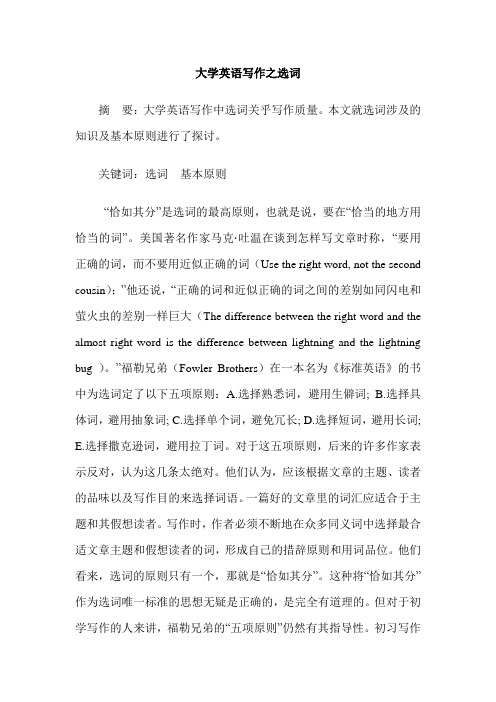
大学英语写作之选词摘要:大学英语写作中选词关乎写作质量。
本文就选词涉及的知识及基本原则进行了探讨。
关键词:选词基本原则“恰如其分”是选词的最高原则,也就是说,要在“恰当的地方用恰当的词”。
美国著名作家马克·吐温在谈到怎样写文章时称,“要用正确的词,而不要用近似正确的词(Use the right word, not the second cousin);”他还说,“正确的词和近似正确的词之间的差别如同闪电和萤火虫的差别一样巨大(The difference between the right word and the almost right word is the difference between lightning and the lightning bug )。
”福勒兄弟(Fowler Brothers)在一本名为《标准英语》的书中为选词定了以下五项原则:A.选择熟悉词,避用生僻词; B.选择具体词,避用抽象词; C.选择单个词,避免冗长; D.选择短词,避用长词;E.选择撒克逊词,避用拉丁词。
对于这五项原则,后来的许多作家表示反对,认为这几条太绝对。
他们认为,应该根据文章的主题、读者的品味以及写作目的来选择词语。
一篇好的文章里的词汇应适合于主题和其假想读者。
写作时,作者必须不断地在众多同义词中选择最合适文章主题和假想读者的词,形成自己的措辞原则和用词品位。
他们看来,选词的原则只有一个,那就是“恰如其分”。
这种将“恰如其分”作为选词唯一标准的思想无疑是正确的,是完全有道理的。
但对于初学写作的人来讲,福勒兄弟的“五项原则”仍然有其指导性。
初习写作的人应该注意使用标准英语,避免使用俚语和非标准英语词汇,只有在非正式场合才使用非正式语。
1 选择合适的词(Choosing the appropriate words)1.1 英语核心词汇(The core of English vocabulary)英语有数以万计的基本词汇,其中,有数千个常用基本词汇。
如何在英文写作中运用恰当的语义和词汇

如何在英文写作中运用恰当的语义和词汇英文写作是许多人学习英语的重要一环,良好的写作技巧可以帮助我们更好地表达自己的思想和观点。
而要在英文写作中运用恰当的语义和词汇,则是一个需要不断学习和提升的技能。
一、选择准确的词汇在英文写作中,选择准确的词汇是非常重要的。
首先,我们需要充分理解所用词汇的具体含义,并进行正确的运用。
作为英语非母语的学习者,我们应该注重拓宽自己的词汇量,通过大量的阅读和写作来提升自己的词汇水平。
其次,我们还应该主动学习词汇的不同用法和搭配,避免使用不恰当的同义词。
例如,"small"和"tiny"虽然都表示小的意思,但在具体语义上有一定的差别,合理选择词汇可以更精确地表达我们的意思。
二、运用恰当的语义语义是词汇和词语之间的意义关联。
在英文写作中,准确运用语义可以使文章更有表达效果。
首先,我们需要理解词汇之间的逻辑关系,合理地组织语义结构。
在句子中,我们通过词汇的搭配、语法结构的掌握和主谓宾的正确使用来实现语义的完整传达。
其次,我们还需要注意语义的一致性和连贯性。
在写作中,我们应避免在同一个句子或段落中使用具有相反语义的词汇,以免造成混淆和歧义。
三、注意上下文的语义理解在英语写作中,上下文语义的理解至关重要。
不同的文章题材和写作目的可能需要使用不同的语义和词汇。
在撰写论述性文章时,我们需要选择一些具有权威性和学术性的词汇,以表达自己对某个主题的观点和见解。
而在叙述性文章或小说中,我们可以通过形象生动的词汇来描绘场景和人物。
在实践中,我们可以通过多读多写的方式积累经验,培养自己对上下文语义的敏感度,以便在写作中更好地运用恰当的语义和词汇。
四、注意词汇和语义的风格和形象在英文写作中,我们可以通过词汇和语义的选择来表达不同的风格和形象。
如果我们要写一篇流畅而优美的文章,可以选择一些具有文学色彩的词汇,如形容词、比喻和修辞手法等,来丰富文章的特色。
另外,在平时的学习和阅读中,我们还可以关注一些经典的英文作品,从中学习和借鉴其中的语言运用和表达方式。
英语作文总结归纳的词语

英语作文总结归纳的词语在英语作文中,总结归纳是一个非常重要的环节。
它可以帮助我们将文章中的观点和信息进行梳理和整理,使文章更加有条理和清晰。
为了帮助大家更好地总结归纳英语作文中的内容,本文将介绍一些常用的总结归纳的词语。
1. 总的来说:Generally speaking, All in all, In conclusion, To sum up在作文的结尾,我们通常会用这些词语来总结整篇文章,概括性地提出作者的观点或建议。
例句:Generally speaking, learning English can greatly improve our communication skills and broaden our horizons.2. 一方面...另一方面:On the one hand...on the other hand,当我们要对文章中的两个相对立的观点或者两个方面进行归纳总结时,可以使用这些词语。
例句:On the one hand, social media provides a convenient way for people to communicate and share information. On the other hand, it also poses threats to privacy and security.3. 此外:Furthermore, Moreover, Additionally当我们需要进一步补充和丰富文章内容时,可以使用这些词语来引入新的信息或者观点。
例句:Furthermore, the study also found that regular exercise can improve mental health and reduce the risk of depression.4. 例如:For example, For instance, Such as,当我们需要通过具体的例子来支持和说明我们的观点时,可以使用这些词语。
四六级英语写作中使用频率最高的实用词语搭配

英语四六级英语写作中使用频率最高的100个实用词语搭配1.经济的快速发展 the rapid development of economy第三方2.人民生活水平的显著提高/ 稳步增长 the remarkable improvement/ steady growth of people’s living standard3.先进的科学技术 advanced science and technology4.面临新的机遇和挑战 be faced with new opportunities and challenges5.人们普遍认为 It is commonly believed/ recognized that…6.社会发展的必然结果 the inevitable result of social development7.引起了广泛的公众关注 arouse wide public concern/ draw public attention8.不可否认It is undeniable that…/ There is no denying that…9.热烈的讨论/ 争论 a heated discussion/ debate10. 有争议性的问题 a controversial issue11.完全不同的观点 a totally different argument12.一些人…而另外一些人… Some people… while others…13. 就我而言/ 就个人而言 As far as I am concerned, / Personally,14.就…达到绝对的一致 reach an absolute consensus o n…15.有充分的理由支持 be supported by sound reasons16.双方的论点 arguments on both sides17.发挥着日益重要的作用 play an increasingly important role in…18.对…必不可少be indispensable to …19.正如谚语所说 As the proverb goes:20.…也不例外…be no exception21.对…产生有利/不利的影响 exert positive/ negative effects on…22.利远远大于弊 the advantages far outweigh the disadvantages.23.导致,引起 lead to/ give rise to/ contribute to/ result in24.复杂的社会现象 a complicated social phenomenon25.责任感 / 成就感 sense of responsibility/ sense of achievement26. 竞争与合作精神 sense of competition and cooperation27. 开阔眼界widen one’s horizon/ broaden one’s vision28.学习知识和技能 acquire knowledge and skills29.经济/心理负担 financial burden / psychological burden30.考虑到诸多因素 take many factors intoaccount/ consideration31. 从另一个角度 from another perspective 32.做出共同努力 make joint efforts33. 对…有益be beneficial / conducive to…34.为社会做贡献 make contributions to the society35.打下坚实的基础lay a solid foundation for…36.综合素质 comprehensive quality37.无可非议 blameless / beyond reproach 39.致力于/ 投身于be committed / devoted to…40. 应当承认 Admittedly,41.不可推卸的义务 unshakable duty42. 满足需求satisfy/ meet the needs of…43.可靠的信息源 a reliable source of information 44.宝贵的自然资源 valuable natural resources45.因特网 the Internet (一定要由冠词,字母I 大写)46.方便快捷 convenient and efficient47.在人类生活的方方面面 in all aspects of human life48.环保(的) environmental protection / environmentally friendly49.社会进步的体现 a symbol of society progress50.科技的飞速更新 the ever-accelerated updating of science and technology51.对这一问题持有不同态度 hold different attitudes towards this issue52.支持前/后种观点的人 people / those in favor of the former/ latter opinion53.有/ 提供如下理由/ 证据 have/ provide the following reasons/ evidence54.在一定程度上 to some extent/ degree / in some way55. 理论和实践相结合 integrate theory with practice56. …必然趋势an irresistible trend of…57.日益激烈的社会竞争 the increasingly fierce social competition58.眼前利益 immediate interest/ short-terminterest59.长远利益. interest in the long run60.…有其自身的优缺点… has its me rits and demerits/ advantages and disadvantages61.扬长避短Exploit to the full one’s favorable conditions and avoid unfavorable ones62.取其精髓,取其糟粕 Take the essence and discard the dregs.63.对…有害 do harm to / be harmful to/ be detrimental to64.交流思想/ 情感/ 信息 exchange ideas/ emotions/ information65.跟上…的最新发展 keep pace with / catch up with/ keep abreast withthe latest development of …66.采取有效措施来… take effective measures to do sth.67.…的健康发展the healthy development of …68.有利有弊 Every coin has its two sides.No garden without weeds.69.对…观点因人而异Views on …vary from person to person.70.重视attach great importance to…71.社会地位 social status72.把时间和精力放在…上 focus time and energy on…73.扩大知识面expand one’s scope of knowledge74.身心两方面 both physically and mentally75.有直接/间接关系 be directly / indirectly related to…76. 提出折中提议 set forth a compromise proposal77. 可以取代“think”的词 believe, claim, maintain, argue, insist, hold the opinion/ belief that78.缓解压力/ 减轻负担 relieve stress/ burden 79.优先考虑/发展… give (top) priority to sth. 80.与…比较compared with…/ in comparison with 81. 相反 in contrast / on the contrary.82.代替 replace/ substitute / take the place of83.经不起推敲 cannot bear closer analysis / cannot hold water84.提供就业机会 offer job opportunities85. 社会进步的反映 mirror of social progress86.毫无疑问 Undoubtedly, / There is no doubt that…87.增进相互了解 enhance/ promote mutual understanding88.充分利用 make full use of / take advantage of89.承受更大的工作压力 suffer from heavier work pressure90.保障社会的稳定和繁荣 guarantee the stability and prosperity of our society91.更多地强调put more emphasis on…92.适应社会发展 adapt oneself to the development of society93.实现梦想realize one’s dream/ make one’s dream come true94. 主要理由列举如下 The main reasons are listed as follows:95. 首先 First, Firstly, In the first place, To begin with96.其次 Second, Secondly, In the second place97. 再次 Besides,In addition, Additionally, Moreover, Furthermore98. 最后 Finally, Last but not the least, Above all, Lastly,99. 总而言之 All in all, To sum up, In summary,In a word,100.我们还有很长的路要走 We still have a long way to go.。
英语写作中的词语替换总结

英语写作中的词语替换总结吴倩形容词/副词Important: essential, significant, vital, crucial, indispensable, requisite, critical Basic:fundamental, underlying, rudimentaryBig: vast, large, huge, tremendous, massive, enormous, immense, gigantic, colossal, gargantuan, giantMany: numerous, myriad, infinitea (large) number of / (large) numbers of +可数名词复数a good/great many +可数名词复数many a +可数名词单数plenty of +可数名词复数/不可数名词a large/huge amount of +不可数名词a great deal of +不可数名词Small: minimum, diminutive, minute, tinyGood: impressive, glorious, brilliant, outstanding, distinguished, remarkable, superb, incredible, fabulous, gorgeous, spectacular, magnificent, excellent, wonderful, amazingBad: harmful, defective, faulty, imperfect, inadequate, substandard, unsatisfactory, damaging, deleterious, detrimental, hurtful, ruinous, unhealthy, evil, immoral…Clever: brilliant, knowledgeable, intellectual, intelligent, excellent, bright, smartHappy: delightful, joyful, elated, pleased, jubilantBeautiful: charming, charismatic, attractive, gorgeous, pretty, endearing, adorable, eye-catching, engagingFast:quick, rapid, swift, speedy, hastyEasy: simple, effortless, painless, plain sailing, uncomplicated, undemandingClear: obvious, apparent, evident, comprehensible, conspicuous, distinct, manifest, plain, recognizableHard: difficult, tricky, complicated, complex, intricate, involved, knotty, perplexing, puzzling, thornyDangerous: perilous, breakneck, hazardous, insecure, precarious, risky, unsafe, vulnerableRich:wealthy, affluent, amplePoor: impoverishedCheap: economical, inexpensiveVery: exceedingly, extremely, intensely动词Think (that): hold the (opinion/ belief/ position/stand point/idea) that, assume, believe, deem, reckon, argue, maintain, suppose, conceive, insist, be convinced, to my knowledge, personally, from my personal perspective, as far as I am concerned, from my point of view, from my angle, consider, conceive, perspectiveShow:convey, reveal, indicate, illuminate, express, imply, demonstrate, elucidate, denote, display, discloseKnow: realize, comprehend, notice, sense, perceive, recognize, understand, figure out Influence: impact, affect, guide, sway,Stop: halt, cease, conclude, desist, end, pause, put an end to, quit, refrain, terminateMak e: create, assemble, built, construct, form, manufacture; fore, cause, compel, constrain, drive, impel, induce, oblige, prevailGive: present, award, contribute, deliver, donate, grant, hand over, hand out, provide, supplyDestroy: ruin, raze, annihilate, crush, demolish, devastate, eradicate, shatter, wipe out, wreck, obliterate, weaken, undermineHappen: occur, come about, develop, result, take place, transpireEmphasize: highlight, stress, accentuate, addressDeal with: cope with, tackleNeed: require, call forTry one’s best to do sth: endeavor to do sth, make a great/concerted effort to do sth, strive to do sth, take pains to do sth名词Problem: issue, question, case, trouble, difficulty, dilemma.Meeting: conference, discussion, assembly, conclave, congress, convention, gathering session, assignation, encounter, confrontation, argument, controversyAdvantage: benefit, dominance, precedence, profit, superiority, meritDisadvantage: shortcoming, weakness, inconvenience, drawback, deficiency, flaw, handicap, downside, limitation.Influence: impact, repercussion, implication Difficulty: hindrance, impediment, hurdles。
英语词语运用的技巧和方法
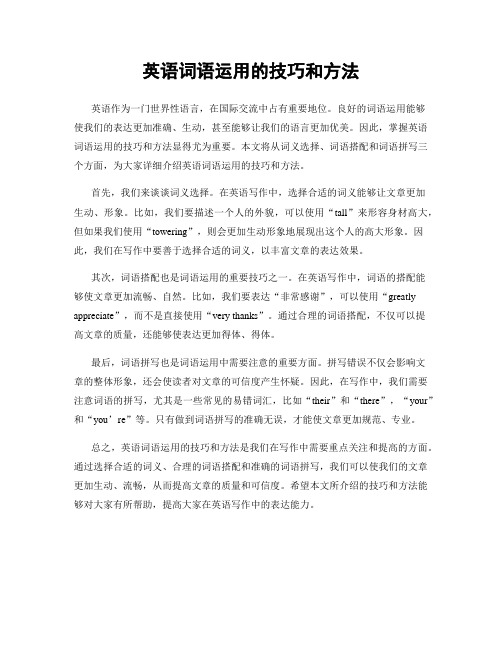
英语词语运用的技巧和方法英语作为一门世界性语言,在国际交流中占有重要地位。
良好的词语运用能够使我们的表达更加准确、生动,甚至能够让我们的语言更加优美。
因此,掌握英语词语运用的技巧和方法显得尤为重要。
本文将从词义选择、词语搭配和词语拼写三个方面,为大家详细介绍英语词语运用的技巧和方法。
首先,我们来谈谈词义选择。
在英语写作中,选择合适的词义能够让文章更加生动、形象。
比如,我们要描述一个人的外貌,可以使用“tall”来形容身材高大,但如果我们使用“towering”,则会更加生动形象地展现出这个人的高大形象。
因此,我们在写作中要善于选择合适的词义,以丰富文章的表达效果。
其次,词语搭配也是词语运用的重要技巧之一。
在英语写作中,词语的搭配能够使文章更加流畅、自然。
比如,我们要表达“非常感谢”,可以使用“greatly appreciate”,而不是直接使用“very thanks”。
通过合理的词语搭配,不仅可以提高文章的质量,还能够使表达更加得体、得体。
最后,词语拼写也是词语运用中需要注意的重要方面。
拼写错误不仅会影响文章的整体形象,还会使读者对文章的可信度产生怀疑。
因此,在写作中,我们需要注意词语的拼写,尤其是一些常见的易错词汇,比如“their”和“there”,“your”和“you’re”等。
只有做到词语拼写的准确无误,才能使文章更加规范、专业。
总之,英语词语运用的技巧和方法是我们在写作中需要重点关注和提高的方面。
通过选择合适的词义、合理的词语搭配和准确的词语拼写,我们可以使我们的文章更加生动、流畅,从而提高文章的质量和可信度。
希望本文所介绍的技巧和方法能够对大家有所帮助,提高大家在英语写作中的表达能力。
- 1、下载文档前请自行甄别文档内容的完整性,平台不提供额外的编辑、内容补充、找答案等附加服务。
- 2、"仅部分预览"的文档,不可在线预览部分如存在完整性等问题,可反馈申请退款(可完整预览的文档不适用该条件!)。
- 3、如文档侵犯您的权益,请联系客服反馈,我们会尽快为您处理(人工客服工作时间:9:00-18:30)。
英语写作中词语的选择.txt你出生的时候,你哭着,周围的人笑着;你逝去的时候,你笑着,而周围的人在哭!喜欢某些人需要一小时,爱上某些人只需要一天,而忘记一个人得用一生1.词语选择的重要性
在The Right Word at the Right Time的“序言”中,编者对词语选用的重要性作了一个很好的比喻:“Using the right word at the right time is rather like wearing appropriate clothing for the occasion:
it is a courtesy to others,and a favor to yourself-a matter of presenting yourself well in the eyes of the world."
显然,说话或写文章时用词适当比穿着适当难度大得多,因而也具有更大的重要性。
在我国,古人写文章时常为一个词语的选用具思苦想,因而有“语不惊人死不休”的说法。
成语“一字值千金”也说明了选择词语的极端重要性。
有时“一字之差”造成令人遗憾的败笔,或招致成千上万的经济损失。
这些反面的教训也告诉我们必须重视词语选用的问题。
2.词语选择的可能性
实际上,我们每个人的脑子里都有了一个或大或小的词库,只要我们肯去发掘,往往可以得到更好的表达方式。
这是我们做好词语选用的主观条件。
从客观条件广看,我们有各种类型的词典和参考书,只要我们平时多翻译、多阅读,写作时勤查考,就会在词语选用上不断进步。
当然,一部好词典也不会毫无缺点,更难以面面俱到,因此在这里我们应牢牢记住著名英国作家、评论家和辞书编纂家Johson的话:
Dictionaries are like watches: the worst is better than none, and the best cannot be expected to go quite true.
3.词语选择的三项标准
关于择语标准,人们说法不一,但准确、鲜明、生动三项原则是公认的。
当然,某词语用得是否符合要求,不可孤立地从词语本身的含义上着眼,还要看其具体使用场合,包括同其他词语搭配等。
1)择语的准确性
准确性,就是要根据使用场合选用确切的语言形式,正如有句英语俗语所言:
Do not write so that your words may be undetstood, but write so that your words must be understood.
著名美国作家马克·吐温说:“用词准确与用词几乎准确,这两者之间的差异就如闪电与萤火虫之间的差异。
”(The difference between the right word and the almost-right word is as great as that between lighting and the lighting bug.)
为了择语准确,必须熟悉词语的多义性。
例如depression对心理学家、经济学家或地质学家来说,含义各不相同:
He is in a state of deep depression as a result of his setback latest experiment.
The depression first hit almost all the small and medium-sized enterprises.
Transportation was at a standstill caused by the depressions in the highways after the earthquake in that area.
反之,也常常有几个词语可以表示类似的含义,如心理学上的“depression”也能用melancholia,the blues,the dismal in the dumps,low等词语表示。
要做到准确选择,有必要注意词语的两种意义:“基本意义”(denotation)和"引申意义"(connotation)。
前者指该词语的本身,或客观的固有含义,后者指该词语在一定搭配或上下句中出现的其他意义,往往比较含蓄,带有词语使用者的主观态度或感情色彩。
如inexpensive和cheap都表示便宜的基本意思,如顾客问营业员:“May I have some thing cheaper?”意思是希望要价钱便宜一点的,当然并不是说质量可以不好,但cheap在其他句式或使用场合可引出“低劣”、“平庸”、“吝啬”、“卑鄙”等多种意思,这类意思正是修辞上的“敏感地带”。
选用词语的准确性还表现在区分表示大体/抽象含义的词语和表示具体/特定含义的词语上,需要根据不同的使用场合做出正确的选择。
抽象含义词语和具体含义词语不是两个对立的家族,在一定的条件下可以转化,如
labor一词通常带抽象含义,但并非一成不变。
试比较:
A)Honest labor creates wealth for the society.
B)In the GM contract dispute, labor seeks a five-cent per hour wage increase.
上述A句中labor一词为抽象含义,泛指各种社会劳动,B句中labor为具体含义,特指WAW,即美国汽车、飞机、农业机械工人联合会。
2)择语的鲜明度
准确性是鲜明度的前提,也是提高鲜明度的基础。
然而,鲜明与简练相关。
英国文豪莎士比亚的名言“Brevity is the soul of wit”相当于汉语的“言贵简洁”。
我们说话、写文章都要以“言简意赅”四字为目标,为此,应从两个方面加以注意:
A.在可以运用较简短的常见词语表达意思时不要用复杂而少的词语,如:do something for(不用perform,
accomplish),用end/finish a letter (不用terminate,conclude)。
B.多余的或转弯抹角的词语都不利于明白地表达思想,因而下列短语中加括号的部分都应省。
